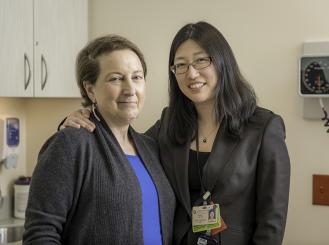May 03, 2021
The first-of-its-kind HER2CLIMB breast cancer study was a career-defining achievement for Nancy U. Lin, MD. In 2020, she was invited to present her work at the ASCO Annual Meeting; in 2021, the study was among the lauded list of research covered in Clinical Cancer Advances 2021: ASCO’s Report on Progress Against Cancer. As she works to prevent breast cancer and uncover more treatment options, the two-time recipient of grants from Conquer Cancer, the ASCO Foundation, is motivated by the patients who have contributed to her discoveries and the colleagues with whom she collaborates.
Dr. Lin is associate chief in the Division of Breast Oncology at the Susan F. Smith Center for Women's Cancers, director of the Metastatic Breast Cancer Program and the Program for Patients with Breast Cancer Brain Metastases at the Dana-Farber Cancer Institute, and an associate professor of medicine at Harvard Medical School. Follow her on Twitter @nlinmd.
What has been your greatest professional accomplishment since receiving a 2005 Young Investigator Award (YIA) and a 2007 Career Development Award (CDA) from Conquer Cancer?
NL: My YIA funded my effort on the very first trial of HER2 targeted therapy (lapatinib) in patients with breast cancer brain metastases. I hope that my work has taken away some of the nihilism that has existed in terms of this patient population and has demonstrated that developing effective systemic therapies is possible and important.
What role do patients play in clinical research?
NL: I always think of clinical trial participants as heroes, because none of the progress we make in oncology would be possible without them.
A former patient, Lisa, was a young woman who had had multiple rounds of radiation to dozens of lesions in her brain when I met her. At that time, we were enrolling patients to a phase Ib study of tucatinib with trastuzumab—a trial that predated HER2CLIMB—and that was limited to patients with progressive brain metastases and had very little preliminary data. Lisa courageously joined the study and saw her central nervous system disease remain in a partial response for over a year and a half, despite prior treatment with lapatinib/capecitabine, trastuzumab, and T-DM1. Later, she enrolled on a neratinib-based trial and also derived some clinical benefit from it.
Sadly, Lisa died at the end of 2020, more than 7 years after she was first diagnosed with brain metastases. She was a tremendous breast cancer advocate, a friend and support to many, and lived life absolutely to the fullest extent possible, despite so very many setbacks and challenges. I like to think that in the extra time she gained, not only did she gain time for herself, but knowing her, there were countless people whose lives she changed in a positive way.
What have you been working on since you presented the HER2CLIMB study at the 2020 ASCO Annual Meeting?
NL: I have collaborated with Jean J. Zhao, PhD, to test new compounds and combinations in preclinical models to try to prioritize which regimens to test in clinical trials, and that has been very exciting work. Several of my mentees have gone on to lead clinical trials testing new regimens in patients with brain metastases. I am working with Sheheryar K. Kabraji, BM BCh, to characterize the genomics of breast cancer brain metastases compared to primary tumors and extracranial metastases, and with Heather A. Parsons, MD, MPH; Jose Pablo Leone, MD; and Antonio Giordano, MD, PhD to characterize serum and CSF cfDNA in patients enrolled in our clinical trials. It is really exciting to work with so many talented individuals who are dedicated to making a difference for patients with brain metastases.
What do you believe is the greatest need in oncology research?
NL: As we develop more effective drugs, especially for certain subtypes such as HER2-positive breast cancer, I would like to see efforts be really ambitious and, in a thoughtful way, consider when we might start thinking about a roadmap to curative-intent approaches for advanced cancers. As we do this, we cannot forget about our most vulnerable populations, whether that is based on sociodemographic factors, disease site (i.e., brain metastases), or disease type/subtype.
Putting together large-scale efforts to link high-quality molecular data collected at the “right” timepoints with high-quality clinical data, on a scale large enough to look at specific therapies, specific patient populations, is something that is going to take a much larger scale of resources than is currently the case, despite exceptionally large investments on the part of ASCO’s CancerLinQ, the National Cancer Institute, etc.
From an operational standpoint, we need to find ways to make clinical trials more accessible to a broader group of individuals, and to make it easier for patients and providers to know when specific trial options are possible. Finally, we need a greater emphasis on implementation research and initiatives to ensure that patients, regardless of treatment site, are able to access the highest quality of care.

